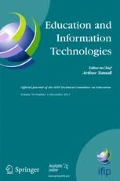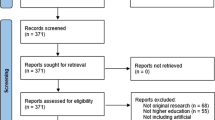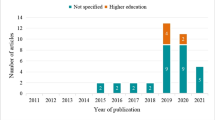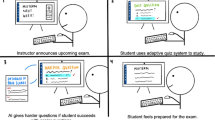Abstract
This study aimed to investigate the effects of using online formative assessments on students’ learning achievements. Using a quasi-experimental study design with one control group (no formative assessments available), and two experimental groups receiving feedback in available online formative assessments (knowledge of the correct response – KCR, or elaborated feedback – EF), it was investigated how feedback type in combination with learning content complexity will affect students’ learning achievements when used in-vivo, in a digital signal processing university course. Data generated by the two experimental groups was additionally used to investigate differences in using online formative assessments based on the feedback type. Study findings suggest online formative assessments are a very efficient educational intervention for this domain. The acquired data suggests that students quickly recognized the value of the formative assessments and that more than 90% of students have used them extensively. Statistically significant improvements in learning achievements were observed in the KCR group compared to the control group (p < 0.01, Cohen’s d between 0.691 and 1.080, depending on the learning content complexity), and KCR group compared to the EF group (p < 0.01, Cohen’s d = 0.877, in the case of most complex of the three learning contents used). No statistically significant differences were found in formative assessment usage between the two experimental groups, aside from the difference in the time between consecutive formative assessment attempts, indicating students did make use of the available feedback. Reported results are significant for demonstrating the potential of online formative assessments in achieving the desired learning outcomes in higher education, as well as for gaining insights into students’ habits of using them.

Similar content being viewed by others
References
Angus, S. D., & Watson, J. (2009). Does regular online testing enhance student learning in the numerical sciences? Robust evidence from a large data set. British Journal of Educational Technology, 40(2), 255–272.
Anthis, K., & Adams, L. (2012). Scaffolding relationships among online quiz parameters and classroom exam scores. Teaching of Psychology, 39(4), 284–287.
Baartman, L. (2008). Enhancing learning through formative assessment and feedback. British Journal of Educational Technology, 39(5), 957–957.
Bälter, O., Enström, E., & Klingenberg, B. (2013). The effect of short formative diagnostic web quizzes with minimal feedback. Computers & Education, 60(1), 234–242.
Bijol, V., Byrne-Dugan, C. J., & Hoenig, M. P. (2015). Medical student web-based formative assessment tool for renal pathology. Medical Education Online, 20, 26765. doi:10.3402/meo.v20.26765.
Brame, C. J., & Biel, R. (2015). Test-enhanced learning: the potential for testing to promote greater learning in undergraduate science courses. CBE Life Sciences Education, 14(2), es4.
Brothen, T., & Wambach, C. (2004). The value of time limits on internet quizzes. Teaching of Psychology, 31(1), 62–64.
Buchanan, T. (2000). The efficacy of a world-wide web mediated formative assessment. Journal of Computer Assisted Learning, 16(3), 193–200.
Carrillo-de-la-Peña, M. T., Baillès, E., Caseras, X., Martínez, A., Ortet, G., & Pérez, J. (2009). Formative assessment and academic achievement in pre-graduate students of health sciences. Advances in Health Sciences Education: Theory and Practice, 14(1), 61–67.
Ćukušić, M., Garača, Ž., & Jadrić, M. (2014). Online self-assessment and students’ success in higher education institutions. Computers & Education, 72, 100–109.
Daniel, D. B., & Broida, J. (2004). Using web-based quizzing to improve exam performance: lessons learned. Teaching of Psychology, 31(3), 207–208.
der Kleij, F. M. V., Feskens, R. C. W., & Eggen, T. J. H. M. (2015). Effects of feedback in a computer-based learning environment on students’ learning outcomes a meta-analysis. Review of Educational Research, 85, 475–511.
Dobson, J. L. (2008). The use of formative online quizzes to enhance class preparation and scores on summative exams. Advances in Physiology Education, 32(4), 297–302.
Einig, S. (2013). Supporting students’ learning: the use of formative online assessments. Accounting Education, 22(5), 425–444.
Gates, A. I. (1917). Recitation as a factor in memorizing (Doctoral thesis). New York, 1917.
Grimstad, K., & Grabe, M. (2004). Are online study questions beneficial? Teaching of Psychology, 31(2), 143–146.
Hall, K. A., Adams, M., & Tardibuono, J. (1968). Gradient- and full-response feedback in computer-assisted instruction. The Journal of Educational Research, 61(5), 195–199.
Henly, D. C. (2003). Use of web-based formative assessment to support student learning in a metabolism/nutrition unit. European Journal of Dental Education: Official Journal of the Association for Dental Education in Europe, 7(3), 116–122.
Horn, S., & Hernick, M. (2015). Improving student understanding of lipids concepts in a biochemistry course using test-enhanced learning. Chemistry Education Research and Practice, 16(4), 918–928.
Johnson, B. C., & Kiviniemi, M. T. (2009). The effect of online chapter quizzes on exam performance in an undergraduate social psychology course. Teaching of Psychology, 36(1), 33–37.
Kibble, J. (2007). Use of unsupervised online quizzes as formative assessment in a medical physiology course: effects of incentives on student participation and performance. Advances in Physiology Education, 31(3), 253–260.
Kibble, J. D., Johnson, T. R., Khalil, M. K., Nelson, L. D., Riggs, G. H., Borrero, J. L., & Payer, A. F. (2011). Insights gained from the analysis of performance and participation in online formative assessment. Teaching and Learning in Medicine, 23(2), 125–129.
Lameris, A. L., Hoenderop, J. G., Bindels, R. J., & Eijsvogels, T. M. (2015). The impact of formative testing on study behaviour and study performance of (bio)medical students: a smartphone application intervention study. BMC Medical Education, 15(1), 72.
Limniou, M., & Smith, M. (2014). The role of feedback in e-assessments for engineering education. Education and Information Technologies, 19(1), 209–225.
Maclean, G., & McKeown, P. (2013). Comparing online quizzes and take-home assignments as formative assessments in a 100-level economics course. New Zealand Economic Papers, 47(3), 245–256.
Marden, N. Y., Ulman, L. G., Wilson, F. S., & Velan, G. M. (2013). Online feedback assessments in physiology: effects on students’ learning experiences and outcomes. Advances in Physiology Education, 37(2), 192–200.
McDaniel, M. A., Agarwal, P. K., Huelser, B. J., McDermott, K. B., & Roediger III, H. L. (2011). Test-enhanced learning in a middle school science classroom: the effects of quiz frequency and placement. Journal of Educational Psychology, 103(2), 399–414.
McDaniel, M. A., Wildman, K. M., & Anderson, J. L. (2012). Using quizzes to enhance summative-assessment performance in a web-based class: an experimental study. Journal of Applied Research in Memory and Cognition, 1(1), 18–26.
McKeown, P., & Maclean, G. (2013). Is activity in online quizzes correlated with higher exam marks? New Zealand Economic Papers, 47(3), 276–287.
McNulty, J. A., Espiritu, B. R., Hoyt, A. E., Ensminger, D. C., & Chandrasekhar, A. J. (2015). Associations between formative practice quizzes and summative examination outcomes in a medical anatomy course. Anatomical Sciences Education, 8(1), 37–44.
Miller, G. A., & Chapman, J. P. (2001). Misunderstanding analysis of covariance. Journal of Abnormal Psychology, 110(1), 40–48.
Mitra, N. K., & Barua, A. (2015). Effect of online formative assessment on summative performance in integrated musculoskeletal system module. BMC Medical Education, 15, 29.
Morgan, M. (1979). MCQ: an interactive computer program for multiple-choice self-testing. Biochemical Education, 7(3), 67–69.
Noyes, J. M., & Garland, K. J. (2008). Computer- vs. paper-based tasks: are they equivalent? Ergonomics, 51(9), 1352–1375.
Palmer, E., & Devitt, P. (2014). The assessment of a structured online formative assessment program: a randomised controlled trial. BMC Medical Education, 14, 8.
Phelps, R. P. (2012). The effect of testing on student achievement, 1910–2010. International Journal of Testing, 12(1), 21–43.
Strang, K. D. (2016). Beyond engagement analytics: which online mixed-data factors predict student learning outcomes? Education and Information Technologies. doi:10.1007/s10639-016-9464-2.
Velan, G. M., Jones, P., McNeil, H. P., & Kumar, R. K. (2008). Integrated online formative assessments in the biomedical sciences for medical students: benefits for learning. BMC Medical Education, 8, 52.
Webb, M., & Gibson, D. (2015). Technology enhanced assessment in complex collaborative settings. Education and Information Technologies, 20(4), 675–695.
Author information
Authors and Affiliations
Corresponding author
Rights and permissions
About this article
Cite this article
Petrović, J., Pale, P. & Jeren, B. Online formative assessments in a digital signal processing course: Effects of feedback type and content difficulty on students learning achievements. Educ Inf Technol 22, 3047–3061 (2017). https://doi.org/10.1007/s10639-016-9571-0
Received:
Accepted:
Published:
Issue Date:
DOI: https://doi.org/10.1007/s10639-016-9571-0




